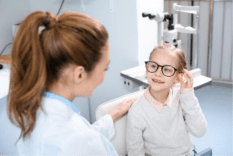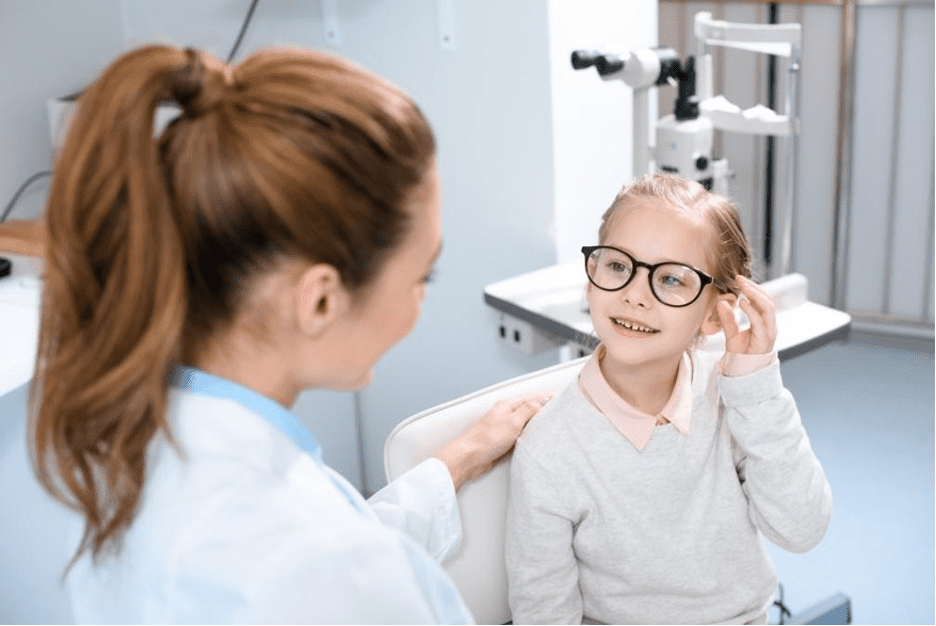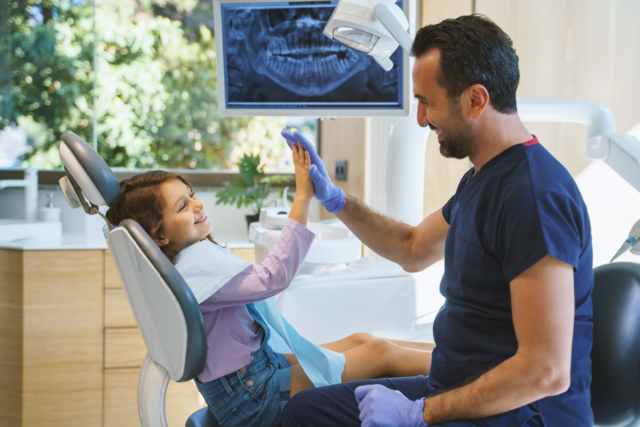Why Eye Exams Are Essential to Kids’ Eyesight

You know to visit the dentist regularly for preventive check-ups, but did you know that annual vision exams are equally as important? Eye exams are essential for children because they can help identify or prevent underlying vision issues before they become worse. By visiting the eye doctor each year, they can document the vision health of your children to determine if any changes occur over time.
In addition, regular exams can reveal early warning signs of more serious overall health conditions. An optometrist, or vision doctor, can detect signs of hypertension, cardiovascular disease, and even diabetes. They also check for things like cataracts, glaucoma, macular degeneration, and sight deficiencies:
- Myopia, commonly known as nearsightedness
- Hyperopia, commonly known as farsightedness
- Amblyopia, commonly known as lazy eye
- Strabismus, commonly known as wall-eyed
How Do Eye Doctors Discover Underlying Vision Issues?
Vision isn’t just seeing 20/20. To be successful in school, a child needs strong eye-focusing ability, hand-eye coordination, and more. Signs that your child is suffering from vision problems include:
- Complaints of discomfort, headaches, or tiredness
- Frequent eye rubbing or blinking
- Short attention span
- Avoidance of reading, homework, or other activities that require close vision
- Covering one eye or tilting the head to see better
- Holding reading materials close to the face
- Eye turning in or out
- Seeing double
- Losing place when reading
- Difficulty remembering what was read
The most comprehensive way to check your child’s eye health is to have a dilated eye exam. This involves the use of eye drops that expand the pupil to help the doctor to get a complete look inside each eye. During this exam, a variety of tests are performed one’s vision, periphery, muscle, responsiveness, pressure, and dilation.
What Else Do They Check?
Eye exams also serve as an opportunity to see exactly how well—or not—your child can see. It’s common for someone to think they have perfect eyesight until it’s time for them to get a pair of glasses or contact lenses. Getting into a vision doctor early can help spare time spent squinting and struggling to see.
How Often Should My Child’s Eyesight Get Checked?
According to the Center for Disease Control, kids should be checked once between birth and three months of age, once between six months and one year of age, around age three, and at five years old. From there, an annual visit is recommended.
If you suspect a vision injury or potential loss of eyesight, or your child complains about blurred vision, visit your provider as soon as possible.
Do You Offer Benefits for Vision Services?
Delta Dental of Wisconsin offers DeltaVision® plans for individuals and for employers. These plans cover exams, frames, contact lenses, and even laser correction procedures, as well as discounts on lenses, at participating providers.
Curious about eye health? Check out this blog for more information.
Related stories
-
3 Pregnancy Tips You Weren’t Expecting
Back pain, morning sickness, fatigue, hunger — it’s hard to know exactly what to expect when you’re … Read More
-
Top 3 Dental Health Risks in Older Adults
Older adults can expect to experience a few age-related changes in their lifetime including problems with the … Read More
-
Creating lifelong oral health habits starts at the dentist
Creating and maintaining good habits is an important skill for everyone, no matter their age. For young … Read More
Sign Up Now
Most Liked
- 1 Do Expiration Dates on Dental Products Matter? 305 Likes
- 2 Is Activated Charcoal Safe for your Smile? 166 Likes
- 3 Crazy and Cool Fish Teeth Facts 91 Likes
- 4 Delta Dental Protects Your Eyes with DeltaVision® Coverage 71 Likes
- 5 The In-between Tooth: Guide to Bicuspids 53 Likes
- 6 Recipe: Quick Pumpkin Pudding 49 Likes
- 7 Bad Taste After Brushing? Common Explanations 44 Likes
- 8 People with Dental Benefits are Healthier 39 Likes
- 9 Own Your Oral Health: Subscribe now for tips to ensure a bright smile 38 Likes
- 10 Signs of diabetic eye problems 36 Likes




